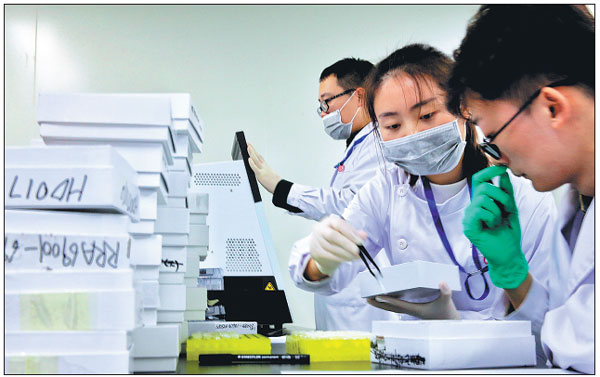Nanjing's Jiangbei New Area impresses visiting journalists
Nanjing, capital of East China's Jiangsu province, showed the world the extent of its innovative achievements during a recent overseas media tour of the province.
The tour, co-organized by the publicity department of Jiangsu province and China Daily, attracted 19 journalists from 17 media outlets in countries including Russia, Japan, the Philippines and Germany, who visited the cities of Nanjing, Suqian, Yixing and Zhangjiagang from Nov 13 to 18.
"As one of the most developed provinces in China, Jiangsu is the epitome of China's opening-up," said Yang Liqun, deputy director of the publicity department of Jiangsu province.
The province's ability in technological innovation has ranked among the country's top in the past several years, Yang said.
Located on the northern bank of the Yangtze River, Nanjing's Jiangbei New Area is a shining example of the province's innovative development, especially in the intelligent manufacturing and advance technology sectors.
Founded in 2016 in the new area, the Sino-German Intelligence Manufacture Research Institute is a cooperative project between Nanjing and Fraunhofer IPK, a German research center and one of the main drivers of Industry 4.0, Germany's industrial development strategy.
The institute aims to integrate the advantages of the two sides to provide more intelligent manufacturing technologies and advanced management experience to domestic companies, as part of its push to support the upgrading of the Chinese manufacturing industry.
Cao Sumin, deputy chairman of the institute, said that most Chinese manufacturing industries have developed to a certain stage, which are required to be upgraded.
"Currently, the biggest demand of enterprises is to increase productivity, lower costs and reduce manpower with the help of intelligent technologies," he said.
To date, more than 50 universities have cooperated with the institute for developing better products, Cao said.
The institute is open to Chinese enterprises and research institutions, said Li Jiang, chairman of the institute.
"We want to help increase the production efficiency of companies through combining the advanced technologies and research fruits of China and Germany," he said.
The institute has established an application research center, a training center and a high-tech products demonstration center, and plans to build its overseas research and development center in Germany, Li said.
Another example in Jiangbei New Area is the National Health and Medical Big Data Center, serving as a storage hub in eastern China for crucial data related to cutting-edge biological technologies such as single cell testing and advanced health management.
The big data center is estimated to store personal health data for 80 million people, and electronic medical records, as well as the medical image data of 160 key hospitals in Jiangsu province. The center has completed the first phase of construction and will continue to build the second data center, according to Shi Xiaoling, a staff member at the center.
The tour of Jiangbei New Area has made a deep impression on the foreign journalists.
"The area is very interesting, seeing all these things in the medical health center is like watching a science fiction movie," said Wilson Flores, a columnist of the Philippine Star newspaper.
"Before this, we thought China was good at mass production of affordable goods," he said. But our views changed after visiting the new area, he added.
"It is incredible to see what has happened here," he said, noting that the progress made by Jiangsu's high-tech industry will contribute to the economic development, not only for China but also for Asia and even the world.

Researchers test products at a laboratory in Nanjing Jiangbei New Area. Jiang Dong / China Daily








